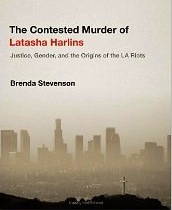 Following the April 29, 1992 acquittal of four police officers in the beating of Rodney King, violence broke out in Los Angeles that resulted in 54 deaths and more than 2,300 injuries. But in a new book to be released next week by Oxford University Press, Brenda E. Stevenson, a professor of history at the University of California at Los Angeles, makes that case that the cause of the riots dates back a bit further to the murder of a Black teenager by a Korean woman shopkeeper in March 1991. Latasha Harlins, a 15-year-old Black high school student was shot in the back of the head by the shopkeeper who believed the teen was shoplifting a bottle of juice. The dead teenager had $2 clutched in her hand, the price of the bottle of juice she supposedly was stealing. The shopkeeper was convicted of manslaughter but served no time in jail.
Following the April 29, 1992 acquittal of four police officers in the beating of Rodney King, violence broke out in Los Angeles that resulted in 54 deaths and more than 2,300 injuries. But in a new book to be released next week by Oxford University Press, Brenda E. Stevenson, a professor of history at the University of California at Los Angeles, makes that case that the cause of the riots dates back a bit further to the murder of a Black teenager by a Korean woman shopkeeper in March 1991. Latasha Harlins, a 15-year-old Black high school student was shot in the back of the head by the shopkeeper who believed the teen was shoplifting a bottle of juice. The dead teenager had $2 clutched in her hand, the price of the bottle of juice she supposedly was stealing. The shopkeeper was convicted of manslaughter but served no time in jail.
 “For many who actively participated in the protest, looting and destruction, and for the thousands who stayed at home, but understood all too well why others had gone, Rodney King was not the symbol of injustice that was being protested; Latasha Harlins was,” writes Professor Stevenson in The Contested Murder of Latasha Harlins: Justice, Gender, and the Origins of the LA Riots. Korean-owned stores in South Central Los Angeles were burned and looted during the 1992 riots, which eventually spread to the Koreatown neighborhood of Los Angeles.
“For many who actively participated in the protest, looting and destruction, and for the thousands who stayed at home, but understood all too well why others had gone, Rodney King was not the symbol of injustice that was being protested; Latasha Harlins was,” writes Professor Stevenson in The Contested Murder of Latasha Harlins: Justice, Gender, and the Origins of the LA Riots. Korean-owned stores in South Central Los Angeles were burned and looted during the 1992 riots, which eventually spread to the Koreatown neighborhood of Los Angeles.
Professor Stevenson’s book traces Harlins’ family history back to slave times. She also gives detailed accounts of the lives of the Korean shopkeeper and the woman judge who decided the case. In each instance, she shows how gender roles in the family and the community played a part in the tragedy.
Professor Stevenson has taught at UCLA since 1990. She is a graduate of the University of Virginia and holds two master’s degrees and a Ph.D. in American history. She is also the author of the award-winning book, Life in Black and White: Family and Community in the Slave South (Oxford University Press, 1996).











